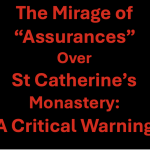By Raymond Ibrahim – Coptic Solidarity –
As first reported here, following Friday prayers on Oct. 24, 2025, a large Muslim mob rose against and “collectively punished” the Coptic Christians of the village of Nazlet Gelf in Minya, Egypt. This latest uprising was born of rumors that an 18-year-old Christian man and a Muslim girl were involved in a relationship. (On the logic that men are the natural leaders in relationships with women, sharia bans non-Muslim men from being involved with Muslim women, though Muslim men can be involved with non-Muslim women.)
Due to this infraction, stones shattered windows, doors were battered, and Christian homes and properties were set ablaze by Muslims shouting threats and vowing to burn churches and expel all Christians. Viral footage captured the terror—including a frightened Coptic girl begging her mother for protection. As usual, security forces arrived and restored order only after the mob had sated its thirst for “vengeance.”
Then, instead of prosecuting the Muslim assailants—and as predicted—local authorities convened a so-called “reconciliation session” (جلسة عرفية) attended by village elders, officials, representatives of both families, and hundreds of villagers. The session’s decisions were, as expected, coercive, extralegal, and contrary to Egypt’s constitution. They included:
- A fine of EGP 1 million on the young man’s grandfather, Napoleon.
- A requirement for the young man’s father, Samih Ishaq, to sell his home and leave the village with his entire family.
- Continued legal prosecution of the young man.
- A ban on posting about the incident on social media.
- A penalty clause of EGP 2 million if the agreement is violated.
- Oversight of the agreement assigned to the village mayor.
The pronouncement—especially the expulsion of the Christian family—was greeted with triumphant applause, “Allahu Akbar” chants, and ululations from the Muslim majority. Coptic witnesses reported that the family accepted the terms only under extreme fear; their homes had already been attacked, and the extended family had fled to avoid casualties.
Meanwhile, the young man has been detained, pending further investigations by the public prosecutor on the “crime” he committed.
Quite telling in this “incident” is the deafening silence by Egypt’s political leaders, all the way to president El-Sisi regarding the imposed deportation of the Coptic families from the village, even though such an act is strictly prohibited by the Constitution, Art. 63, which states: “All forms of arbitrary forced displacement of citizens are forbidden. Violations of such are a crime without a statute of limitations.” Wouldn’t this explain that such assaults on the Copts are part of an institutionalized state policy?
Nazlet Gelf is far from an anomaly; this same exact pattern has played out repeatedly across Egypt. For example, in April of 2024, in al-Kom al-Ahmar, a Muslim mob attacked Christian homes after the minority received a permit to construct a church. Rather than pursue justice, authorities organized another of these closed-door “reconciliation sessions,” during which Christians were again pressured to forego charges in exchange for vague assurances that their church permit would remain intact (assurances that typically prove worthless).
Five years prior, on April 30, 2019, in the village of Nagib, reconciliation sessions similarly nullified protections under Egypt’s Church Construction Law, allowing attackers to escape accountability while Copts were forced to acquiesce to Muslim sensibilities.
The structure of these sessions follows a “good cop/bad cop” routine. Authorities, acting as the “good cops,” urge Christian leaders to accept further concessions to appease the rioting Muslims mob—the “bad cops”—lest things get even worse, with little that they, the authorities, can do about it. Christians are told to close churches temporarily, attend services in neighboring towns, and leave their homes and villages (as in the present case)—in short, comply with the mob’s arbitrary demands.
Copts are further “reminded” that any attempt to seek legal redress above and beyond the reconciliation session will only invite further retaliation. Christian youths who defend their homes or churches are often arrested, detained for hours or days, and threatened with charges—unless, of course, the Christian leaders agree to the humiliating terms of the sessions.
Reconciliation meetings thus institutionalize the punishment of victims and the impunity of perpetrators, under the guise of “reconciling” without getting the law involved.
Tellingly, the official response from Egypt’s Ministry of Interior only confirmed this pattern of denial and inversion. In its statement on the Nazlet Gelf attack, the Ministry rejected any religious motivation, describing the assault merely as “a dispute between two families… following a relationship between a young woman and a member of the other family,” while lamenting that “some parties attempted to give the incident a sectarian dimension.” It added that “the two families reconciled during a customary reconciliation session in accordance with the traditions and customs of the village,” adding that this “does not conflict with the legal measures taken.”
In other words, the government narrative erases the religious element entirely—reducing an organized Muslim mob’s attack on Christian homes to a “family dispute”—while glorifying the extralegal reconciliation session as a legitimate resolution. The Ministry’s warning against those who “exploit the incident to undermine the spirit of brotherhood and national unity” only reinforces the state’s priorities: suppress discussion, preserve appearances, and deny that Christians were targeted because of their faith.
The outcome in all such “state approved” sessions is predictable and consistent: the attackers emerge triumphant, emboldened to repeat their offenses, while the Christian victims pay the price with their freedoms, homes, property, and security. The system creates a veneer of legality and “harmony,” while in reality it enforces a hierarchy in which Copts occupy a highly precarious and subordinate position. The ostensible goal of social cohesion masks a deliberate subordination, turning every attack into an opportunity to reinforce minority vulnerability.
Bishop Makarious of Minya, commenting in 2024 on the persistent assaults against Christians, noted bluntly: “As long as the attackers are never punished, and the armed forces are portrayed as doing their duty, this will just encourage others to continue the attacks, since, even if they are arrested, they will be quickly released.”
Nazlet Gelf demonstrates that this pattern endures. Law, justice, and constitutional protections are consistently subordinated to social engineering designed to appease the Muslim majority at the expense of the Christian minority. Far from being isolated incidents, these events are part of a systematic approach in which Muslim attacks on Copts—often presented in Egyptian media as “sectarian violence”—are tolerated, perpetrators rewarded, and victims coerced into silence and displacement.
In short, reconciliation sessions are not conciliatory; they are instruments of state-sanctioned coercion. They convert acts of violence into a theatrical display of communal resolution while ensuring that the only beneficiaries are the aggressors. The victims—Christians who already navigate a web of legal obstacles to build churches or maintain property—are left to absorb the costs: financial, psychological, and physical. The state quietly approves, the law is bypassed, and the discrimination and violence continues with official acquiescence.





